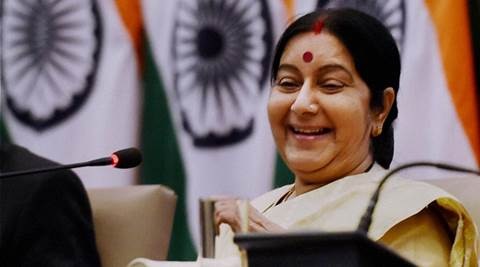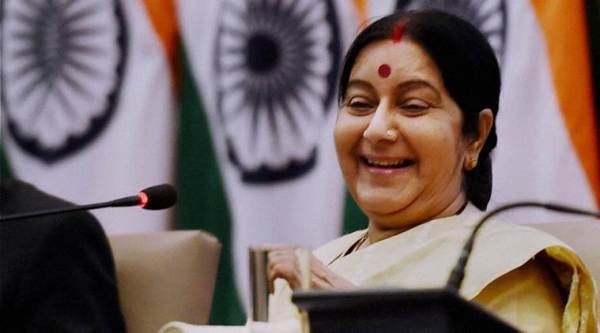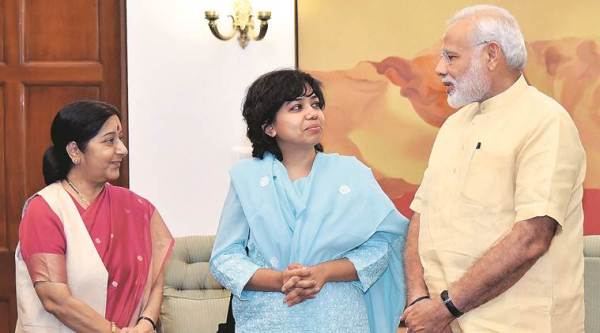Opinion Gurdip Singh case shows how Sushma Swaraj has made foreign ministry accessible to everyone
PM Modi is actively pursuing and dictating the government's foreign policy initiatives, but Swaraj has been instrumental in making the crucial ministry more responsive

 External Affairs Minister Sushma Swaraj. (Source: PTI)
External Affairs Minister Sushma Swaraj. (Source: PTI)
Minutes before he was to be executed by a firing squad in Indonesia, Indian convict Gurdip Singh got a second shot at life. He was spared from execution. Back home in Jalandhar, a telephone call early morning dramatically changed the sombre mood to one of euphoria and celebration. Gurdip called up his family and thanked the Indian government and Foreign Minister Sushma Swaraj for this ‘miracle’.
Gurdip was charged for carrying Heroin and subsequently sentenced to death by a firing squad along with 13 others. The Foreign Minister is believed to have played a key role in this miraculous escape. Ever since the case was highlighted by the media, Swaraj followed it up. In a tweet on July 27, she wrote, “Gurdip Singh is facing death sentence in a drug case in Indonesia. We are making last minute efforts to save him from execution on 28 July.”
Today, when the news came that Gurdip has been spared from execution, Swaraj tweeted, “Indian Ambassador in Indonesia has informed me that Gurdip Singh whose execution was fixed for last night, has not been executed.”
This is not the first time that her quick response and intervention has helped an Indian national in foreign land. Just browse through her Twitter timeline, one will see how actively she responds to SOS calls from the Indian diaspora. Last week, Judith D’souza was rescued from her abductors in Afghanistan. Though Swaraj praised Indian Ambassador Manpreet Vohra for her release, many believe she led the campaign in this case as well.
 Prime Minister Narenda Modi and External Affairs Minister Sushma Swaraj meet Judith D’Souza, an Indian charity worker kidnapped in Kabul. (Source: PTI Photo)
Prime Minister Narenda Modi and External Affairs Minister Sushma Swaraj meet Judith D’Souza, an Indian charity worker kidnapped in Kabul. (Source: PTI Photo)
This February, an Indian woman had urged the government to bring her back home from a refugee camp in Germany. In a YouTube video, she had said her husband’s family had cheated her and brought her to Germany. Sushma Swaraj intervened and asked her officials to help the woman. Officials from the Indian consulate in Frankfurt rescued her.
In all these cases, her personal influence and response have helped these people in a foreign land. The Africa summit scheduled in New Delhi earlier this year was in jeopardy when many countries from the continent threatened to boycott the meet in the wake of attacks on their nationals. They claimed these attacks were racially motivated. Swaraj, however, assured an African delegation that the government was working on a “major strategy” to address their concerns. On the verge of being cancelled, the summit did take place. And many attributed this to the efforts of the foreign minister.
When the new government took charge in 2014, Prime Minister Narendra Modi took personal interest in revamping India’s foreign policy. Since then, Modi has been calibrating the new foreign policy, taking personal interest in defining its contours and setting the agenda. In this regard, he has visited a number of countries to improve India’s relationship.
Many now argue that Sushma Swaraj has been sidelined and that the Foreign Ministry is Modi’s baby. No denying the fact that the PM is actively pursuing and dictating the government’s foreign policy initiatives, but Swaraj has been instrumental in making the crucial ministry more responsive. An otherwise out of reach ministry is now accessible to the common man.






